This article about BET Original series dominating the list of top cable shows among Black audiences got me thinking.
About chess!
I’m not the most prolific chess player ever. And I’m not the guy that’s going to be able to tell you the names of strategic chess openings, call out any of the great players, or even beat your standard 15-year-old high school chess team player. But like Al Bundy, who scored 4 touchdowns in a high school football contest, I do know a thing or two about the game.
BET titles making up 7 of the top 10 shows, in terms of Black viewership, drives me to think about chess because it makes me think about BET’s overall strategy. In other words, if building a modern platform for Black audiences is a game of chess, are BET and its parent company, Paramount, making the right moves?
I’m not so sure.
So I decided to look into a few things they’re doing, what others are doing, what the Black cultural zeitgeist is doing, and anything else that could help us analyze whether BET needs to change its strategy. So let’s dive in. Hopefully, at the end of this, unlike me at the end of a chess game, we won’t be scrambling towards a no conclusion. Or as it’s known in chess, a “stalemate”.
BET’s Current Moves: The Pawns of Black Entertainment
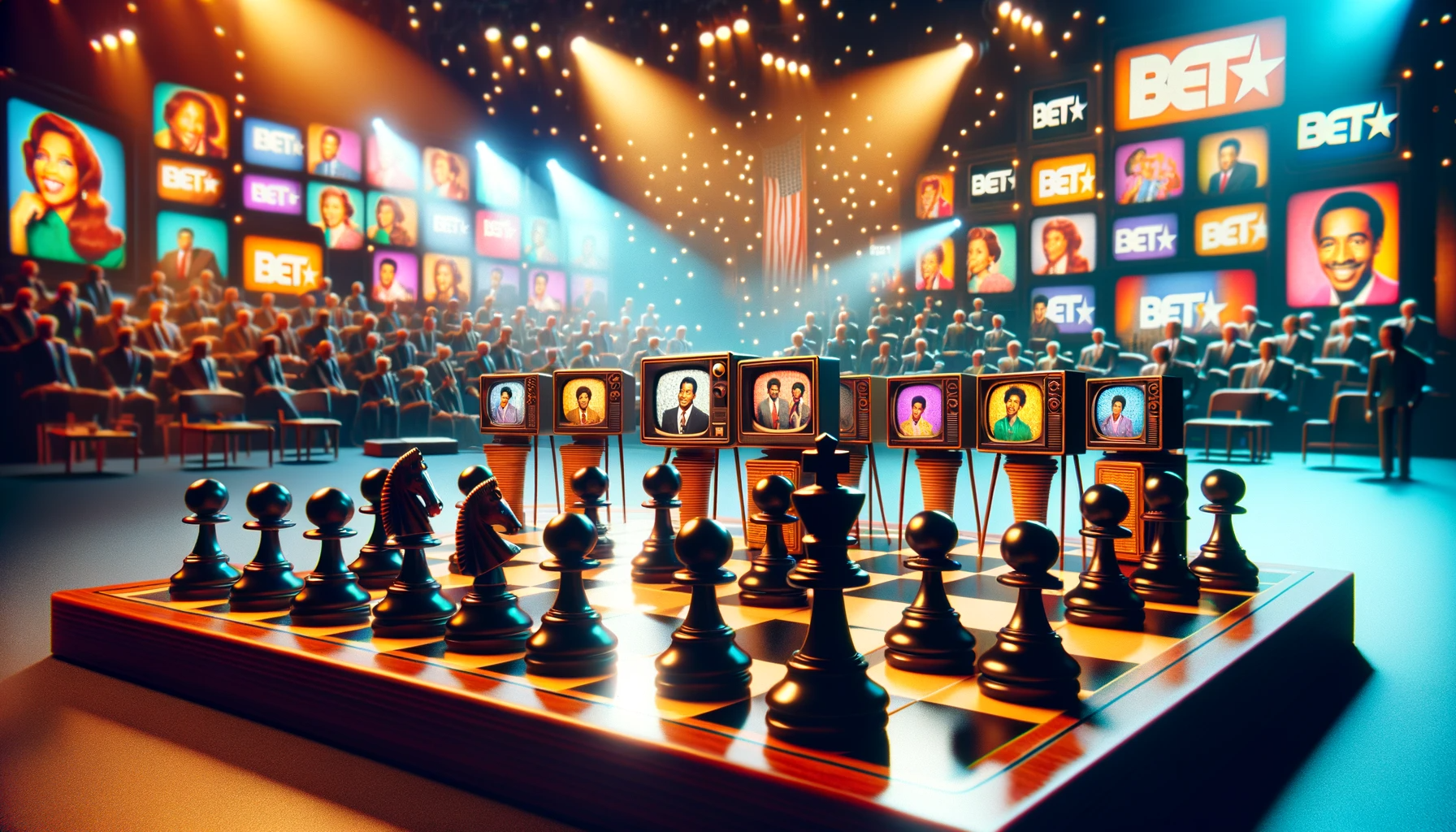
Pawns often get a bad wrap as pieces in chess. Importantly, they are the most numerous pieces in a game of chess, and they form the frontline of any strategy. However, because of their perceived simplicity and limitations (they can only move 1, sometimes 2, spaces forward), they are often dismissed and seen as eventual sacrifices. That is why, culturally, people often call things they view as trivial “pawns”.
But as any good chess player knows, nothing could be further from the truth. Yes, pawns are foot soldiers. But as with any war, foot soldiers make up the core of any strategic play. And have the potential for dynamic transformation and power. Pawns may start the game with small and curious moves. Yet, if used correctly, pawans can ultimately transform into other pieces, suddenly becoming even bigger parts of the game.
To me, that’s what the Tyler Perry Cinematic Universe on BET represents. They are BET’s pawns in the mission to build the de facto modern Black entertainment platform.
In the aforementioned article, Scott Mills, CEO of BET, likened Tyler Perry and his content to Pixar. That’s the animation company Disney famously partnered with and eventually bought in 2006. That ultimately boosted the Mouse House’s prowess in animation.
But I don’t think Pixar to Disney is the appropriate analogy for BET’s partnership with Tyler Perry. If this were a game of chess, what Disney did was make Pixar their queen, which we’ll define later, but for all intents and purposes, it’s a very powerful piece.
Animation is what Disney does best. And the addition of Pixar allowed them to vastly defend that core competency by adding creative talent, innovative storytelling, technical aptitude, and most importantly, ongoing intellectual property to Disney. Furthermore, by purchasing Pixar, this was clearly a long-term strategic move by Disney.
On the flip side, Tyler Perry’s addition to BET was about building from the ground up and short-term expediency. It allowed BET to create content at prolific rates with a built-in Black audience. They also would be bringing much of Perry’s back catalog to its soon-to-launch streaming product; BET+. Additionally, another distinguishing factor for the BET-Tyler Perry relationship is that BET can only rent Tyler Perry. Neither Perry nor this back catalog is BET’s forever. Thus, the BET-Perry relationship cannot have the lasting impact that the acquisition of Pixar and its intellectual property had on Disney.
But again, that doesn’t mean that Perry’s content coming to BET wasn’t incredibly important. The success of shows like “Sistas”, “The Oval”, and “House of Payne” on BET have been incredibly important to BET and its Original Series lineups that came to the cabler starting back in 2019. These shows allowed BET to re-acquire the traditional cable audiences they had long lost. It was an easy way for them to get an audience they knew was there, but that they hadn’t engaged with in some time. For years, BET was floundering in its Original Series aspirations. Shows like “Real Husbands of Hollywood” and “The Game” were perfect for the ascending social media era. However, those young audiences were hard to retain, and those shows were often expensive to make. By partnering with Perry, and giving him an equity stake in BET+, the cabler is now able to create lots of content, affordably and predictably, for an older audience that was and is more tied to traditional cable.
And clearly, as the most recent Nielsen ratings demonstrate, the strategy has worked. Owning 7 of the 10 most watched Black shows on cable, with 5 of them coming from Tyler Perry, certainly creates the foundation for a winning strategy. “Sistas” averaged 930,000 viewers per episode this Fall and was the highest rated Black show during between July and October.
However, if the goal is to build a modern platform for Black audiences, success solely on a decaying cable TV ecosystem with shows that, generally speaking, attract an older, more traditional Black audience, cannot be the way forward.
Targeted TV Shows, and Do Knights Run the World?
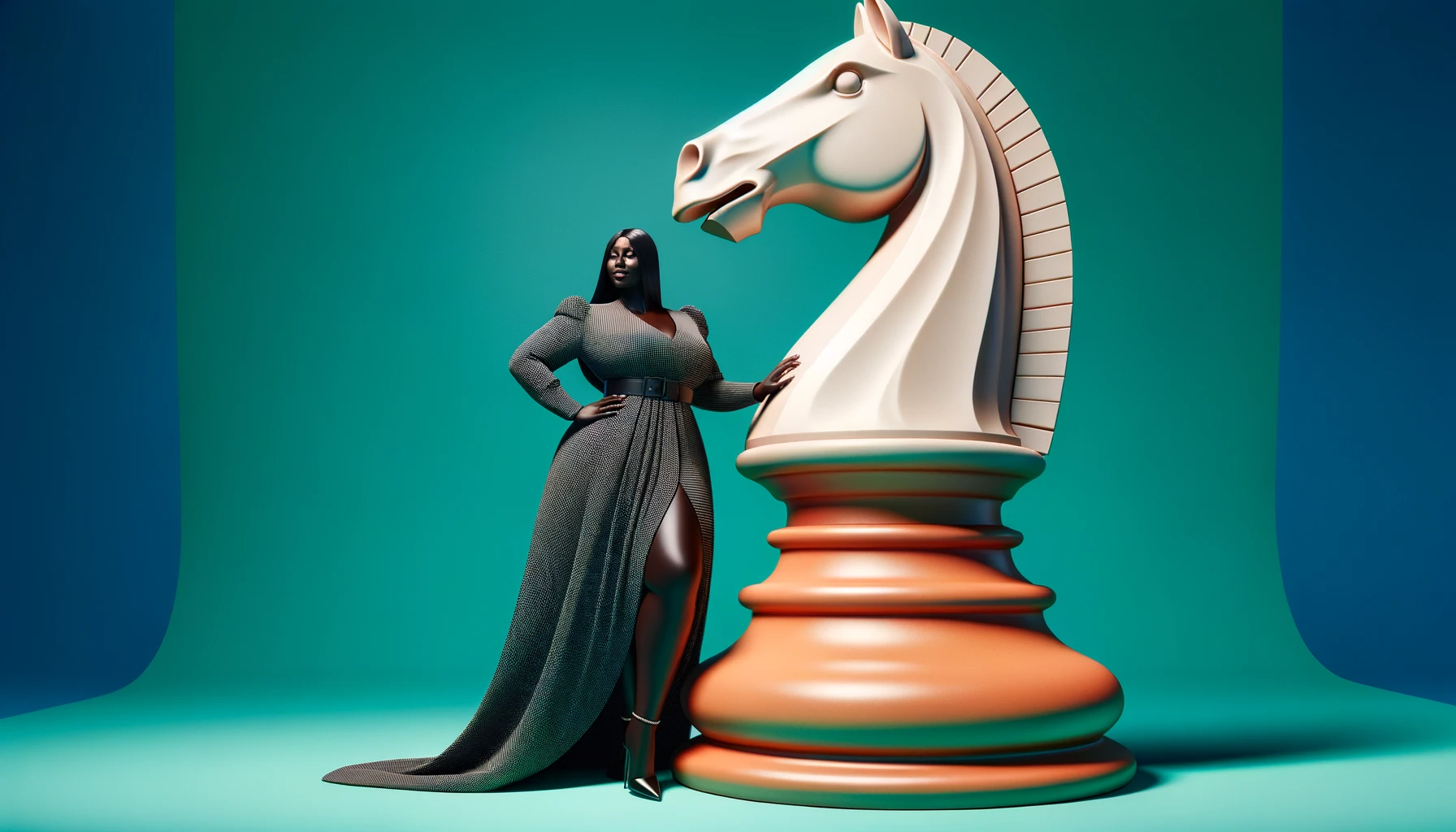
In chess, knights are considered unpredictable. Yes, for those in the know, they have an L-shaped like movement, but the directional options they can take, and the numerous paths at which they take them, making accounting for a knight’s next move quite confounding. Still, while the knight piece’s next move is hard to predict, its range is limited. Unlike other strong pieces on the board, a knight can only go 3 blocks out from where it started.
Thus, in the quest of building a modern Black entertainment platform, knights are best represented by the shows that can go in any direction, take you to a very specific place, and can dominate a certain corner in the zeitgeist, but at the same time, can only reach but so many people. A great example of a show like this is “Insecure”. The show by Issa Rae is highly acclaimed, was always the buzz of the internet whenever it was airing a new season, and it specifically resonated with a more digitally native audience that was willing to go and find new episodes of the show, wherever on the world wide web they may be. And yet, the ceiling on the number of people that watched it was relatively low. Obviously, we don’t have the numbers “Insecure” garnered on HBO Max. Still, the show’s numbers relative to other shows available on both HBO Max and HBO linear weren’t great. It’s 260,000-viewer average in its final season suggest it wasn’t close to being one of HBO’s more widely viewed programs.
However, just like the knight piece on a chessboard, shows like “Insecure”, “Run the World”, “South Side”, or “Godfather of Harlem” aren’t really designed to reach far and wide. Instead, these shows are important for their ability to have an impact on a subset of people. I’m generalizing here, but it’s hard to find a TV-loving Black woman that doesn’t watch or at least feel the impact of a show like “Insecure”. But I can find a lot of brothas who don’t. And if you love the city of Chicago, unapologetic comedy, and are a fan of some underrated Black comics, then chances are you probably know about “South Side”.
For any modern Black content platform hoping attract Black audiences today, you need to have the type of cultural impact and influence that those knight-like TV shows bring. And it’s almost a requirement that the impact is targeted. Of course, everyone wants to have their own “Game of Thrones”, and we’ll speak to that shortly. However, shows for everyone aren’t the only way of the world anymore.
Not for Black people.
Not for anyone.
Today’s viewers are so used to getting a litany of videos, Tweets, and articles served up to them. And they all match the user’s exact interests and points of view. That makes the notion that anyone would find themselves beholden to a streaming service that only had shows that resonate with the masses contrary to anything succeeding in the world of entertainment today. Take CBS for example. They’re often the broadcast network with the most viewers every year, because it has the most shows designed to be liked by everyone. Well, it was the most-watched network again for the 15th straight year. But CBS, along with its parent company, are being talked about as being up for sale. Not for sale to another media company, but to private equity. In other words, even other media companies don’t highly value the broad reach CBS’s programming is able to achieve.
Of course, targeted content flies in the face of the Streaming Wars. Every streamer during and after the pandemic started doing anything they could to replicate the content wars of before. They wanted big shows that cost big money, with big names attached to them. And while yes, that brings users in, you can’t have that be all that you are. People will sign up, watch your big talked about show, and then disengage—at best. Instead, what you need is targeted “knight” programming. A slate replete with shows that bring in specific audiences that drive conversations on subreddits, Twitter and group chats. Without these, you risk becoming irrelevant 100% of the time your big shows aren’t airing. And given their costs, time, and difficulty to make, you’re usually living life without them more than you are with them.
While BET is doing this in its own way, it hasn’t fully invested in the strategy. Shows like “Bigger”, “Twenties”, and “First Wives Club” were among their first foray into targeted, high end programming. But they backed away fast. It’s likely those shows didn’t bring in the subscribers and engagement they were looking for. It’s also could be as simple as those shows didn’t generate the online chatter they were looking for. Either way, they were well-accalimed shows that BET moved away from, and now their platform is lacking in this area. That being said, a new show like “Average Joe” was perhaps a realization they needed to revisit this space.
Bridging the Black Audience Gap with Bishops
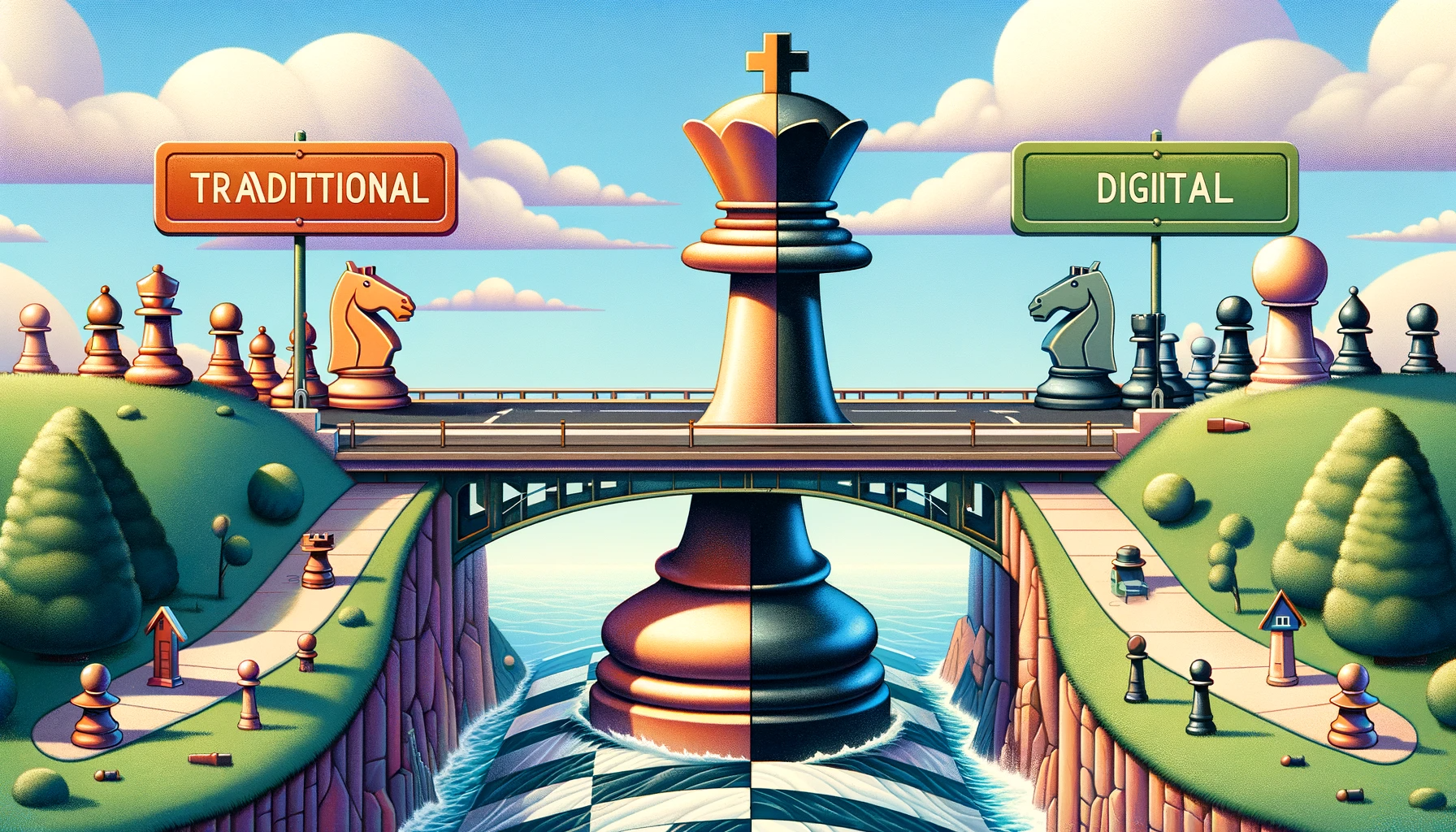
Bishops are relatively simple pieces on the chessboard. They move diagonally. Whatever colored block they start out on, they’ll remain on that color for the remainder of the game. However, and perhaps most importantly, they move the entire length of the chessboard, which makes these pieces super amenable.
In content, I liken Bishops to the shows that reach the traditional audiences that the “Sistas” of the world can reach, but they can also tap into the more targeted audiences we see from knight programming, like “Insecure”.
BET+ is actually doing something interesting in this vein with the show “Zatima”. It’s a spin-off from “Sistas” that the biggest fans of the show have to subscribe to BET+ if they want to watch new episodes as soon as they come out. Eventually, BET airs the shows on their cable channel as well. That allows their more traditional, and less motivated audiences, to watch the show as well. It’s a strategy that has appeared to work. The stars of show have seen their visibility skyrocket, and this past fall, “Zatima” averaged 630,000 viewers per episode on BET.
Like the Bishop, a show like “Zatima” can successfully traverse the entire board. It can start off reaching a super targeted audience, but its reach can also span into the viewers of “Sistas”, many of which would be inclined to see where some of their favorite characters go, even if it’s off into a realm, format or (even) device that they are not usually comfortable with.
Going forward, every modern platform will need these types shows, especially platforms that target Black audiences. Given that Black people represent 13% of the population, it’s not as easy to have a blockbuster hit. So your best chance at success is to have a show that can capture both traditional and streaming-aligned segments of the Black audience. “Insecure” was not something that most Black people who primarily watched cable television sitcoms came across. And while I’m no spring chicken, “Sistas” is not that huge among my millennial circle. But here and there, I know people who watch “Zatima”—a show that did a great job of taking two of its more rambunctious characters, who also happen to be two of their more social media savvy actors, and making the show a digital first play, that has probably been a boon to BET+’s numbers.
But the Rooks May Be the Key
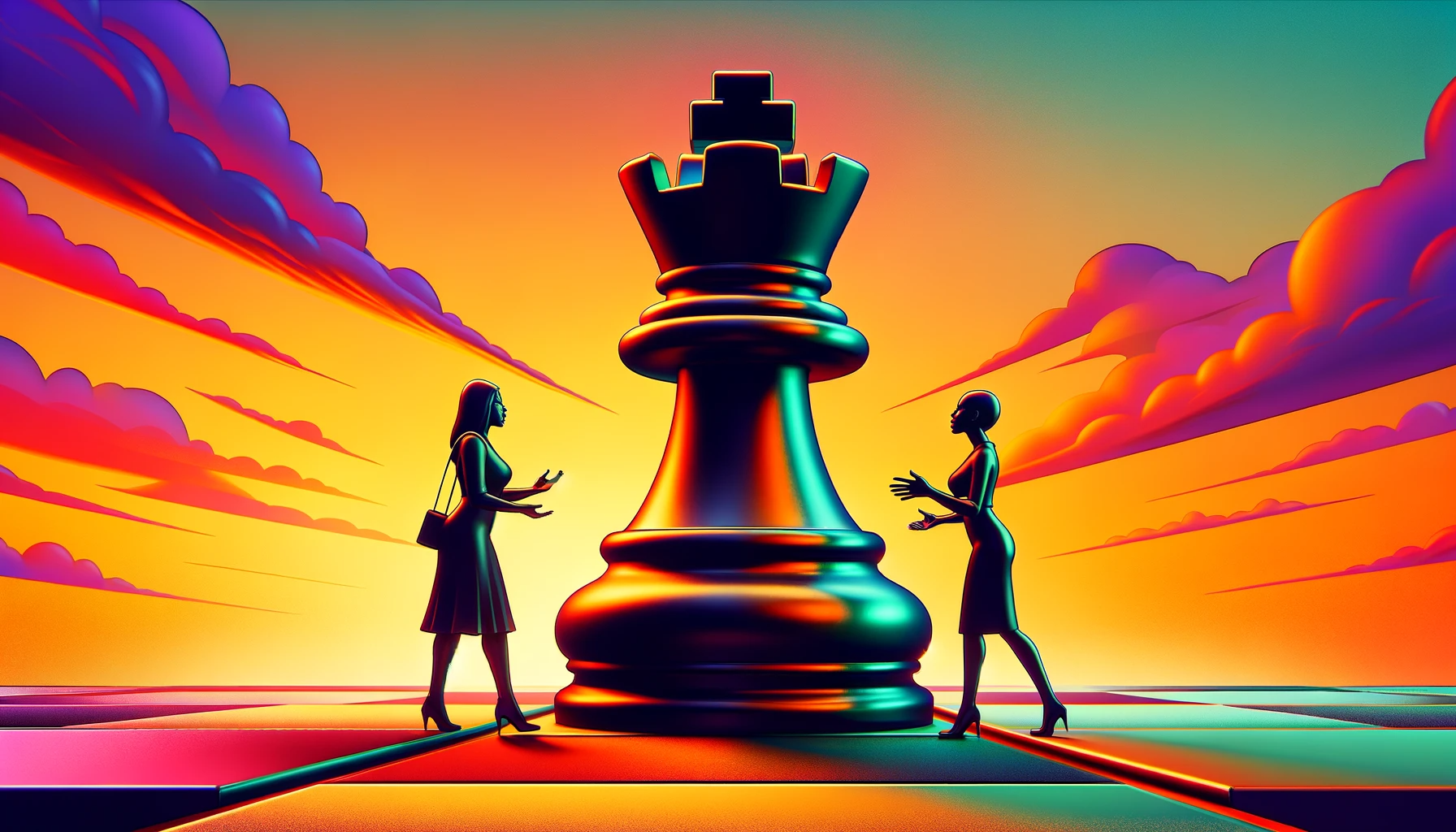
I’ll admit, I struggled to come up with an analogy for what “rooks” chess pieces could represent when building a modern Black content platform. So I looked into exactly why rooks are considered important in chess. Something that came up is that early on in a game, rooks are the cornerstones of defense. But in the later stages, they can also be key for attacking because of their ability to travel the entire board. Upon reading that, it was clear that unscripted content TV shows are the rooks of the content world. Yes, whenever folks are talking about the streaming wars, unscripted content often gets left out. But that will ultimately be at any single streamer’s peril—especially a streamer that intends to do well with attracting Black audiences.
It’s no coincidence that in 2022 and 2023, we saw a plethora of Black reality shows hit the TV market. Steve Harvey got a show pretending to be Judge Judy. Ms. Pat also has a small claims court show. And even Eboni K. Williams has such a show on Amazon Prime now. Now, this may be controversial to say, but I don’t think Ms. Pat and Ms. Williams were partnered with because their distributors thought they were the perfect people to bring in a slew of white viewers, which makes up two-thirds of the population. And while Steve Harvey certainly has managed to crossover, his appeal with Black audiences is undeniable. So, while I certainly can hold for the fact that this statement may end up not being 100% accurate, I would venture to say that these 3 shows were plays for Black audiences on their respective platforms.
And they’re smart to do so.
Unscripted content is if nothing else, consistent. Once you find an unscripted show your audience likes, it can go on forever. And the beauty of unscripted shows is that at first, like a rook in chess, it can be used purely as a defensive move, because the cost of an unscripted show is much cheaper than scripted. But later on in a show’s life, or in the platform’s life, it can be offensive, spitting out spin-offs that can work across audiences and platforms.
No one has been better at the use of “rooks” in their content strategy than Bravo, which obviously has a big business with the “Real Housewives” franchise in general. However, Bravo probably owes its soul as a brand to the “Real Housewives of Atlanta” edition, which has been the network’s biggest show, entirely driven by its resonance with Black audiences, as demonstrated by it being in the Nielsen Top 10 with all those other Tyler Perry television shows. “Real Housewives of Atlanta” has spun off dozens of shows with singular characters from the cast. It has spawned entirely new Black-led housewife shows, like “The Real Housewives of Potomac” and “Married to Medicine”. And it, more so than any of the other housewife editions, has been a big driver of converting the Bravo cable audience over to its sister streamer, Peacock, with reality spin-offs featuring former Atlanta castmates.
For Bravo and NBCUniversal, “The Real Housewives of Atlanta”, as well as maybe some other reality shows, may be the biggest part of its strategy to acquire Black viewers. And as streamers look for ways to scale back content costs, I think it’s safe to say other platforms will lean this way too.
The Queen of Content Distribution

If you know anything about chess, then you know the “Queen” is the most powerful piece on the chess board. She moves wherever she wants, whenever she wants, however she wants. She can make short moves, long moves, targeted moves, defensive moves, or just get the hell out of the way. Whatever is needed, the Queen piece can get it done.
That said, there is no single show that is analogous to that. No show can demonstrate the range that the Queen can on the chess board. Thus, I look at the Queen not as a show, but as a partner to shows—a distribution and marketing partner. Or in better words, the Queen is the vehicle through which we win the game. Because in chess, if the Queen dies, yes you have life, but is it worth living?
In building a modern day Black content platform, you have to be able to reach your audience where they are. And the Black audience, perhaps more so than others, is possibly getting even more bifurcated. Like other groups, Black people also have a divide between those who primarily get their content from cable, and those who get it from digitally native sources. But Black people are also increasing their educational attainment levels, moving into more white collar jobs, and becoming cognizant of the things and brands they want to be associated with. So unlike with other groups, where the content habits are largely derived from age differences and getting smaller; within Black culture, the divide may be more so coming from socioeconomic differences that are possibly increasing.
That’s why BET’s strategy of relying on both its cable channel and its streaming platform to reach its audiences is key. However, it’s lacking.
Why?
Well, while you can get BET shows in a lot of places, you can’t get it all in one place, for one price. If you’re a diehard fan of “Sistas”, but you move and don’t get a cable subscription, you’ve often been out of luck trying to get it anywhere else. “Zatima”…? You can watch it on BET Plus, but you’d have to wait a while to watch it on cable. How about for the millennials out there who want to watch the old-school series “The Game”, which was original to BET for six seasons? Sorry, it’s not even available on BET Plus? There was a more modern revival of “The Game” too, but you could only watch that on Paramount, not on BET. BET recently launched the aforementioned Black TV show “Average Joe” this past summer, but you could only watch that on BET+, not on BET.
And so on. And so forth.
But wait, there’s more!
You actually can watch a bunch of BET Original series on other streamers. “First Wives Club”, one of BET’s first digital shows, now has all of its seasons available on Netflix. You can also find “Real Husbands of Hollywood”, and “College Hill: Celebrity Edition” on Netflix. And other shows focused on Black audiences from BET’s parent company are left off BET+, but they are available on Showtime and Paramount.
It’s very confusing, and if you’re a fan of Black content, it really makes it hard to be loyal to BET, because you can’t rely on the simple fact that you’ll get the best of the network when you want to get it.
They need to treat their queen—the way they distribute and market their shows—better than that. They have to have a strategy that allows them to reach their audience anywhere and not just anyhow. People need to know where they will find their favorite Black TV shows and not feel duped that they paid for it expecting a show to be in one place, only to find out it now lives in another.
And for Black audiences, as I alluded to before, this is crucial. While there are many things about our favorite Black TV shows and content that we appreciate as a whole culture, we are a very large and fractured audience. Black people over index in our use of social media. Black users are some of the biggest consumers of YouTube. We tend to subscribe to more video streamers than the average person. Some of us love Tyler Perry. Others of us would never. Some of us love “Insecure”, but some of us would never. Not to mention, we watch many of the same shows our white counterparts watch, meaning we have to fit shows like “Game of Thrones” and “The White Lotus” into our TV diets alongside all of the Black content we’re also consuming.
Thus, the harder you make it, real or perceived, to find your platform’s shows, the more likely Black audiences are going to choose to take their eyeballs elsewhere—especially, if we view a network, like a Starz or an AllBlk, doing all they can to win us over. Ultimately, how a platform distributes its shows will determine not only if audiences find them, but if audiences want to find them. If BET continues to drop the ball on this, they can have all the pawns, bishops, rooks and knights they want, but they won’t win the game if they lose sight of their Queen.
Content is King, but the King is on the Run
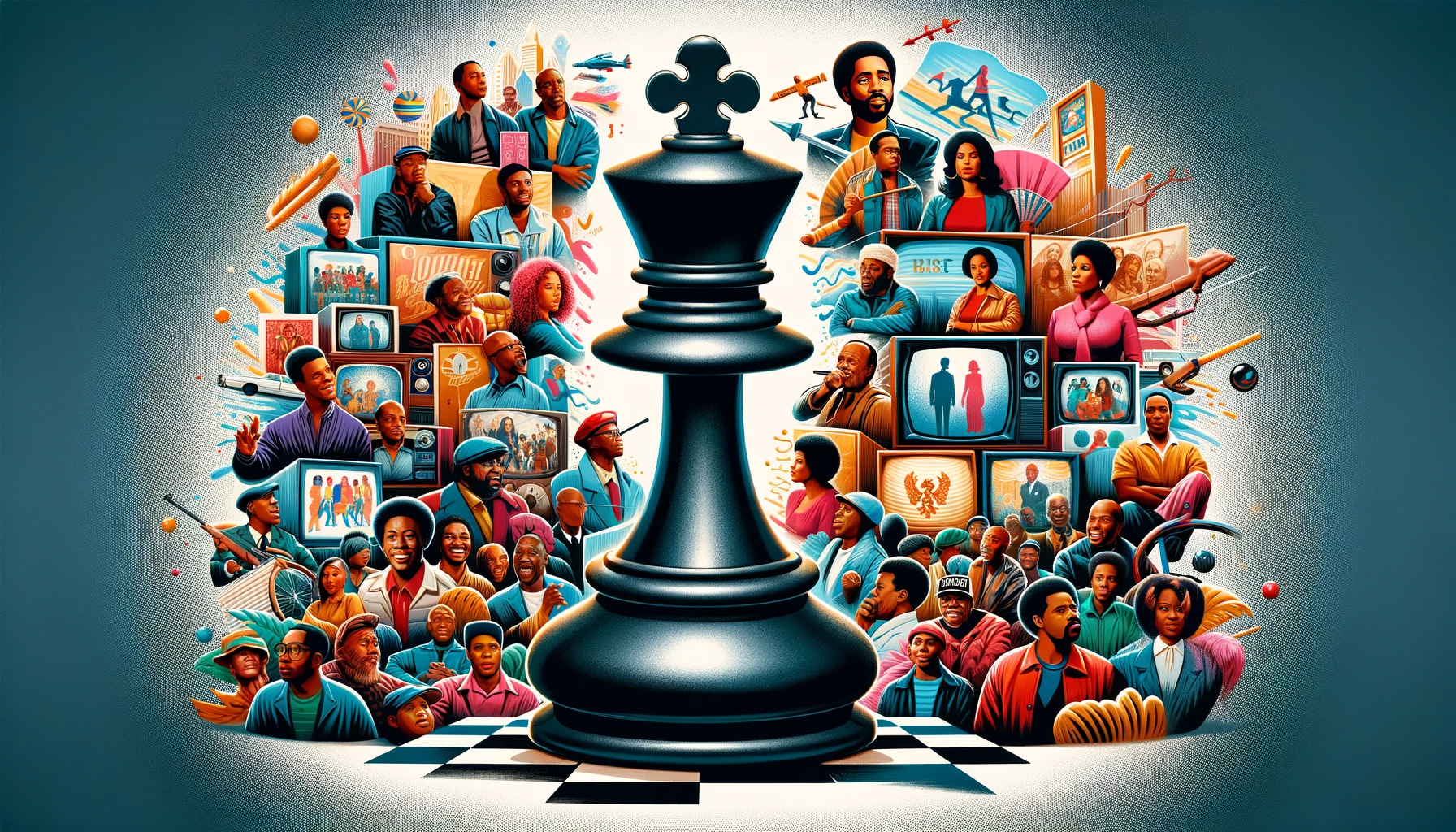
In chess, the Queen piece may be the most powerful, especially since the King piece can only move 1 block at a time.
But the game is over if the King dies.
So while I don’t fully agree with the meaning behind “Content is King”, I know you can’t have a modern day content platform of any kind without content. But does having the best content win out?
No. We’ve seen this time and time again. “Breaking Bad” was on the verge of being canceled at AMC if Netflix hadn’t shared it with millions of its users. “You” was another cable show that we’d barely discovered before it was revitalized by the streamer. Back when the parent company was still called CBS, former CBS CEO Les Moonves admitted on earnings calls that putting CBS shows on Netflix was the best promotion for their current shows. And “Schitt’s Creek” was a nothing burger airing in Canada before it was brought to the U.S. via Netflix and became one of the most decorated Emmy-winning shows in the history of Hollywood.
So even the best of content can be mired in the mud if it doesn’t get exposed to the right and large audience. Unfortunately for the true creatives out there, the reverse can be true: a bad show can do very well if put in front of a lot of people. After all, there’s an audience for everything. Remember “Tiger King”…?
But that doesn’t mean that special content doesn’t do special things. “Game of Throne” probably would’ve thrived on PBS if they had the rights. “Stranger Things” may be on Netflix, but a lot of other shows on Netflix aren’t pulling in the kinds of numbers that show does. And when you think about other properties like sports, news, or awards shows, the channel they’re on is usually such a non-factor that the rights get passed around year after year after year. These highly-regarded, and highly-watched, pieces of content are the true kings, or in other words, “Game of Thrones” and sports programming are “King Content”.
And while no network can rely solely on “King Content”, they do have to be in the business of at least trying to create it. Netflix will probably be just fine if it never has another show as big as “Stranger Things”, but its existence will be a whole lot better, and more hassle free, if they figure out a way to remain in the zeitgeist (and acquire subscribers) with another show of that caliber.
But King Content shows are more than just shows with large budgets. They have to accomplish at least three things, with the third being particular to Black audiences. But first, they obviously must achieve the task of reaching mass popularity. With certain shows, that may require relying on your distribution (Queen), but ideally, it’s just a matter of making it so good, so talked about, so desired, that no matter where you put it, people will come. Easy, right?
Second, “King Content” also has to be critically acclaimed. I know there may be some pushback against that. But look at BET Original Series, which have just a handful of Emmy nominations among them, and yet, they’re dominating the cable ratings for Black viewers. The end result? BET is now up for sale. So that tell how little those cable ratings matter in this day and age. And while the Emmys are not the end-all-be-all, especially for Black content that most Hollywood voters don’t watch, universal acclaim from the audiences you desire is a must. Imagine launching a Marvel movie that attendees at ComicCon thought was awful? Do you think a new sport that gets laughed at on ESPN would do well by moving to NBC? Of course not. Getting good remarks from the audience you expect this to work with the most is key, and there’s no way around that if we’re talking about creating game-changing content.
And third, and most specific to building a Black content platform, is that the show has to engender conversation—online or off. Now, you may be saying that this applies to all shows. And maybe it does. Although, “Big Bang Theory” was like the biggest show on Earth, and I don’t think that was a huge topic of conversation. Also, “Bridgerton” was a hit, but I don’t think the Shonda Rhimes show is all that talked about.
But for Black audiences, this is a must. As I said before, we over index on social, and we want to engage with our favorite shows in our favorite forums, on the remains of Black Twitter, during Thanksgiving dinner, and in the line waiting to get into the club.
Obviously, for the targeted shows, where it’s all about impact with a specific show, this is relatively easy. Your entire goal is to speak to one specific audience. But how do you speak to us all?
Well, there are two ways—in my estimation.
You can just be on all the time. This is the approach for many of Tyler Perry’s shows—they’re like the Dunkin Donuts light—always on, with new episodes of his biggest shows, like “Sistas”, coming out seemingly every week, each one more riveting and “cliff-hangery” than the next. But of course, shows like that—mass produced—typically don’t do so well in the acclaim category.
Or you can build a world, which for many reasons, does a great job at capturing the zeitgeist of my people. Shows like “Power”, “P-Valley”, and “Lovecraft Country” are all world-building shows that got us talking. Naturally, the audiences invested in those worlds talked about them at large online. But as we know, not everybody is interested in somebody’s else’s world.
So if being “always on” and “worldbuilding” will get folks talking, but can’t guarantee you the large audience required to establish “King Content”, then how does “King Content” ever get created?
Luck!
You think Netflix knew “Squid Game” was going to become the biggest show in the world? Did Bravo know that when they ran that Atlanta-based spin-off of “Real Housewives of New York” that it would go on to overtake the original? Did Starz know that “Power” would yield four other shows that would go on to be drivers of success for the network?
They couldn’t have.
So instead, they just started somewhere. Typically, you start with the world building that will drive conversation. And then you hope it can become something bigger than you ever imagined. Or you go with the “always on” approach of a reality show or a procedural just to see how it might land. You never know, you may have the next “Law & Order”.
By starting in one of those two places, with increased development time and resources to achieve the acclaim you need, and a marketing and distribution strategy to get the show in front of the masses, you can maybe get people talking about the “King Content” show you’re trying to create.
Checkmate or Stalemate?

In the desire—hell, my desire—to build a modern day black entertainment platform, the writing is on the Nielsen Top 10 wall. While I love everything Tyler Perry is doing as a business man and a creative, his leading cable shows are not making the cultural impact that I think we want to see from the leading name in Black entertainment.
Something more is needed.
As I’ve alluded to, the Tyler Perry Cinematic Universe is a step in the right direction. Those shows are the foot soldiers (pawns) to a new paradigm, and with it, BET could possibly find itself in a good spot if they leverage that content and audience wisely.
But if we want to see a Black platform have true impact, we must diversify our content even further. BET was at its peak culturally in the 90s when it was the place we turned to for music, original standup comedy, movies, and culturally relevant news and conversations. We need that. We need that unscripted content (the rooks) to be the anchor that keeps our traditional viewers where they are, and brings in digital viewers of various groups.
We need the targeted content (the knights) that speaks to the complexity of the Black audience. Gone are the days when “Family Matters” and “Hanging with Mr. Cooper” are enough for us. With so much content, TV and non-TV alike, to choose from, Black people, and all people, want to be spoken to—on their terms, and from the writers and creators that speak to them.
We also need some of our shows to cross over into both traditional and digital audiences (bishops), and we need to put those shows in the right distribution and marketing channels (Queens) for them to succeed.
Lastly, we really, really, really want, but maybe not need, our modern Black content platforms to give us those cultural game-changing shows (King Content) that sweep over the entire Black populace and capture the zeitgeist the way only a handful of shows are capable of doing.
Today, that’s not BET.
And that is probably why it was up for sale this past summer. I don’t think Paramount has given them the capital nor the freedom to do what is needed to achieve the goals of a modern day Black content platform. That being said, no one else is doing this either. In fact, it has never been done. Today, there are only a handful of platforms that have captured the hearts and minds of any audience. There’s Netflix. There’s Disney—albeit, not profitably. There’s Crunchyroll—but only outside of Japan. And there’s ESPN in the world of sports.
Thus for Black audiences, there’s still a platform to be built. Whether BET will be able to do it under its current corporate structure remains to be seen. And while what we’re trying to do at BlackOakTV is full of promise, we too need much more investment if we are going to become THE platform for Black audiences.
But the chess board is out there, and I’ve laid out the strategy (or at least parts of it). It’s time for someone to build the Black entertainment platform of the future, because these chess pieces have been moved around a lot, and generations of Black viewers are facing a stalemate if someone doesn’t make the right moves.
What do you think the next big move in the quest for Black audiences should be? Comment below, and let me know!
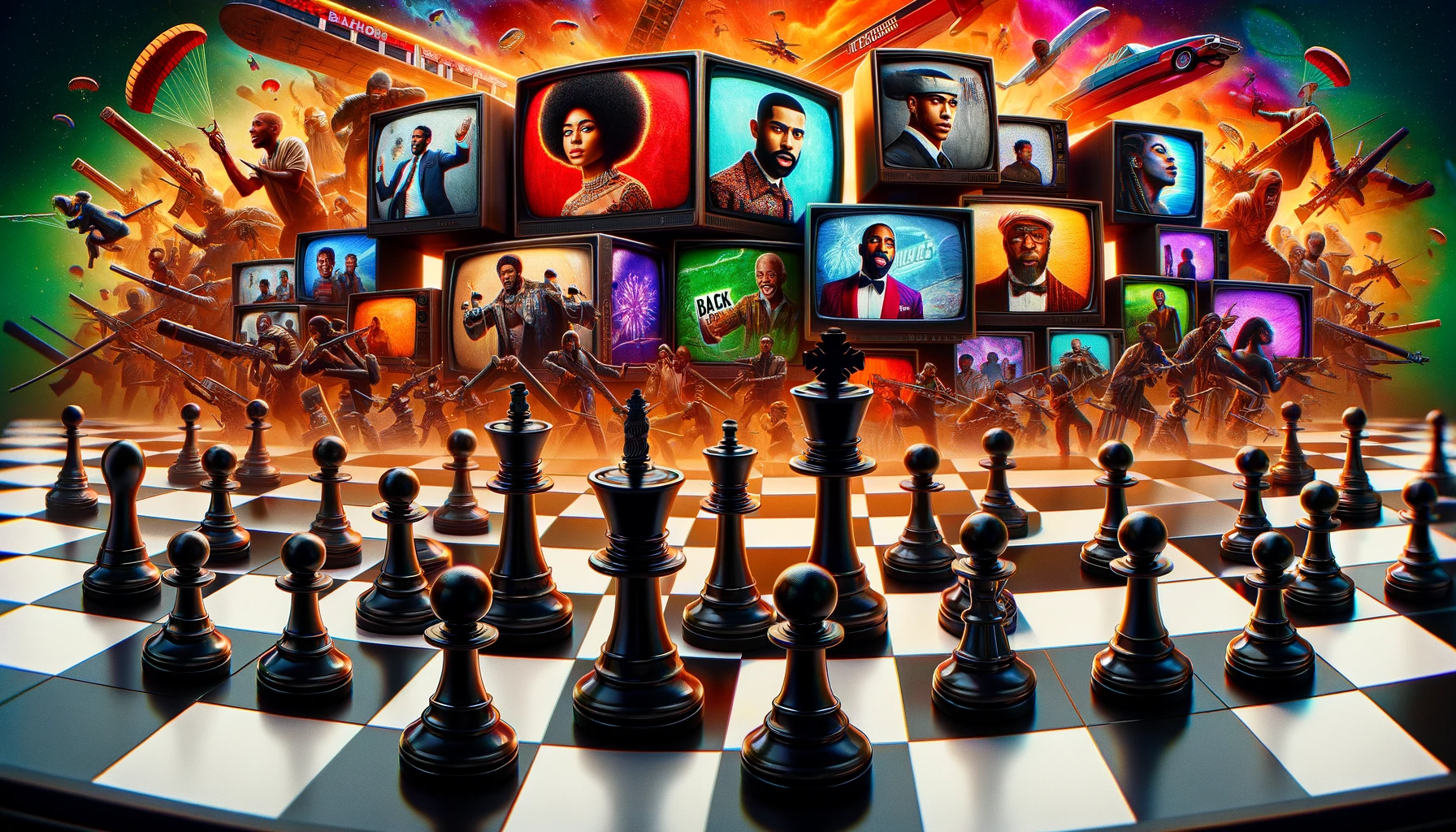
Leave a Reply
You must be logged in to post a comment.